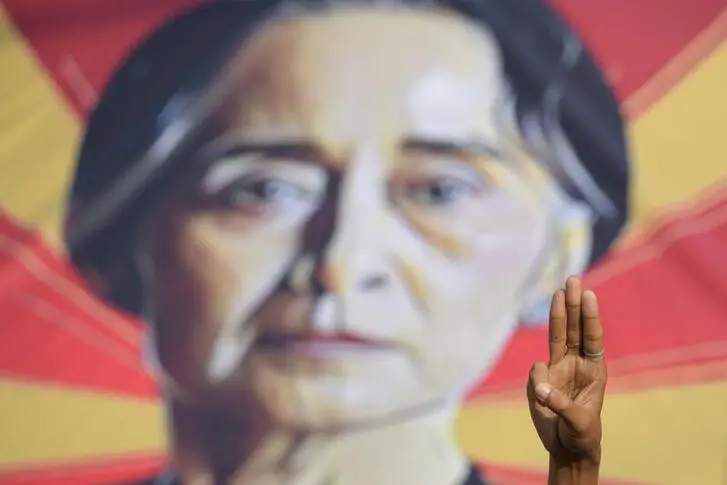PHOTO
Aung San Suu Kyi started 2021 as the democratically re-elected leader of Myanmar, and a pattern of successful elections in the country was beginning to take shape for the first time since the 1960s.
Threatened by her popularity, and fearing the build-up of an irreversible democratic momentum in the country, the Myanmar military reasserted direct control over the government in a coup in February. Suu Kyi has spent the rest of the year under arrest, while the military wages a crackdown on pro-democracy protests among the civilian population, which is still valiantly and staunchly resisting the imposition of a military dictatorship.
For the time being, Suu Kyi remains the face of democracy in Myanmar. But her part in the story of democracy in her country is effectively over. And her legacy is already dissolving.
In early December, Suu Kyi was formally sentenced to two years in prison for inciting unrest and breaking pandemic regulations. She is now on trial for a further nine alleged offenses. If she is cleared of these, more charges will be brought forward. So long as the military remains in control of the government in Myanmar, Suu Kyi is certain to spend the rest of her life in prison.
However, this does not alter the fundamental political reality of the struggle for democracy. For one, everyone understands that the imprisonment of Suu Kyi is politically motivated. This will not dent her standing among the pro-democracy movement. But much more importantly, Suu Kyi is no longer a necessary part of the pro-democracy coalition and, indeed, it seems that the movement is finally beginning to outgrow her.
Since the formation of the National Unity Government in April, the organization of the pro-democracy movement is no longer directed by, or reliant on, Suu Kyi and her small cadre of lieutenants at the top of the National League for Democracy party. For the first time in its history, the movement is driven from the bottom up by a genuinely diverse range of constituents, largely based in the local communities who are bearing the brunt of the military’s crackdowns.
Non-Burmese minority ethnic groups are equal parts of this new struggle for a secular democracy in Myanmar, and perhaps even have an advantage in the pro-democracy resistance due to their long experience resisting the abuses of the military in their local areas. Yes, the NLD remains a kind of central nexus in the broader movement, but even the NLD is changing, as younger voices come to the fore.
The moment the democracy movement changed can be pinpointed to June 3, 2021, when the NUG issued a statement inviting “Rohingyas to join hands with us and others to participate in the spring revolution against the military dictatorship in all possible ways.”
The Rohingya genocide of 2016-17 is perhaps the most defining event of Suu Kyi’s tenure in government. The Nobel Peace Prize laureate not only failed to speak for the human rights of a group of her compatriots while the military was conducting its “clearing operations,” but also spared no effort in supporting and providing cover to the military as their operations expelled over 700,000 from the country of their birth.
Suu Kyi used her international standing to mollify the international community and UN agencies, consistently defended the actions of the military in the international press, and even defended its actions in the genocide case brought against the country at the International Court of Justice in the Hague. Suu Kyi and some of the old guard of the NLD were all morally, and perhaps even practically, implicated in the genocide. This core of the NLD originally resisted international calls on the NUG to include the Rohingya in the struggle for democracy.
But by June something new emerged out of the NUG: A vision for a democratic future in Myanmar that is not predicated on ethnic Burmese and nationalist Buddhist domination, but which includes everyone, even the most historically maligned and marginalized minority groups. This is in stark contrast to the vision for democracy espoused by the NLD for over three decades, and is driven by a new generation of leaders from across the country’s many constituencies.
If democracy has a future in Myanmar, it is this new generation that will usher it in. And if they succeed, it is this young generation who will be rightly recognized as bringing about a new dawn in the country, while Suu Kyi will quietly fade into history as a brief and failed experiment in collaborating with tyrants.
• Dr. Azeem Ibrahim is a Director at the Newlines Institute for Strategy and Policy in Washington DC and author of ‘The Rohingyas: Inside Myanmar’s Hidden Genocide’ (Hurst 2016).
Copyright: Arab News © 2021 All rights reserved. Provided by SyndiGate Media Inc. (Syndigate.info).





















